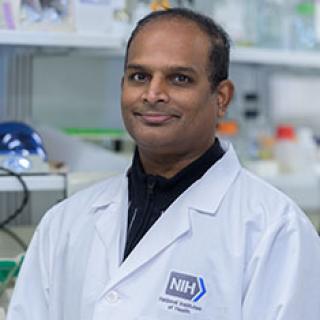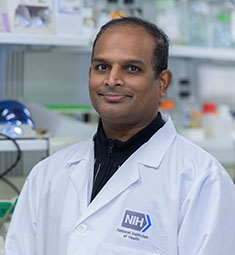
Ravindra B. Chalamalasetty, Ph.D.
- Center for Cancer Research
- National Cancer Institute
- Building 560, Room 21-21
- Frederick, MD 21702-1201
- 301-846-6507
- 301-846-7117
- chalamalasettyr@nih.gov
RESEARCH SUMMARY
Research in cancer biology and developmental biology have greatly benefitted from each other’s progress over the past few decades. A closer look reveals that many of the molecular and cellular processes essential for the normal embryonic development are mis-regulated in cancer progression. In our lab, we are specifically interested in understanding the molecular mechanisms that regulate tissue homeostasis. A delicate balance of stem cell self-renewal and differentiation is required for the maintenance of normal embryonic structures, adult organogenesis, and wound repair. However, the molecular, genetic and cellular cues essential for this biological process are not very clear. We are utilizing a variety of approaches from molecular biology, mouse genetics, embryonic development, embryonic stem cell differentiation, functional genomics and bioinformatics to address these questions.
Areas of Expertise

Ravindra B. Chalamalasetty, Ph.D.
Research
My research centers on understanding molecular mechanisms that govern stem cell self-renewal and differentiation. Wnts are stem cell factors essential for normal embryonic development, differentiation, migration and specification of mesodermal progenitors. Wnts bind to receptors to relay signal transduction via b-catenin to activate down stream target genes. Over the past few years I have taken molecular, genetic and genomic approaches to identify and characterize Wnt target genes. My main research interests are: (1) To understand how Wnts regulate self-renewal of stem cells and at the same time essential for cell-fate determination and differentiation. (2) To understand the molecular cross-talk of Wnt signals with other signaling pathways such as FGF, Notch-Delta and BMP signaling during embryonic development and cell fate determination. (3) To delineate gene-regulatory network by identifying molecular mechanisms at the level of Wnt regulated transcription factors. (4) To understand the molecular mechanisms of developmentally regulated genes in cancer initiation and progression.
Publications
Biography

Ravindra B. Chalamalasetty, Ph.D.
Dr. Ravi Chalamalasetty obtained his Ph.D. in cell biology in the laboratory of Prof. Dr. Erich A. Nigg at Max Planck Institute for Biochemistry in Munich, Germany in 2006. Dr. Chalamalasetty studied the mechanisms of mammalian cytokinesis and was mentored by Dr. Erich A. Nigg and Dr. Herman Sillje. He received the Max Planck Fellowship for Doctoral Students from 2002-2006. For postdoctoral studies, he joined the Cancer and Developmental Biology Laboratory at the National Cancer Institute at Frederick in Dr. Terry Yamaguchi’s lab as a visiting fellow. Since 2015, he has served as a Staff Scientist at the National Cancer Institute at Frederick.
